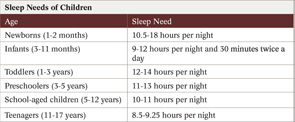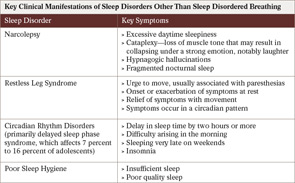But first, Dr. Garetz said, parents need to be aware that their child is tired. “Surveys show that 90 percent of parents think their teens are getting enough sleep,” she said.
Explore This Issue
January 2010Parents also need to recognize that symptoms of sleepiness in the young child include irritability, hyperactivity and high energy, nearly opposite to the symptoms seen in adults. Data show that sleep needs vary throughout life (Table 1).
The following are simple things parents can do help their children achieve optimal sleep:
- Establish a routine with no distractions from electronics.
- Put younger children to bed when they are drowsy but not already asleep so they can learn to fall asleep on their own;
- Ensure that the bedroom is comfortable: quiet, dark, and not too cold or hot;
- Have the child do something calming during the hour before bedtime, while avoiding stimulating activities like watching TV or videos; and
- Restrict or avoid caffeine.
Parents can also help their children develop good sleep hygiene by demonstrating it themselves. According to Dr. Garetz, surveys show a strong correlation between parental and child sleep deprivation.


Leave a Reply